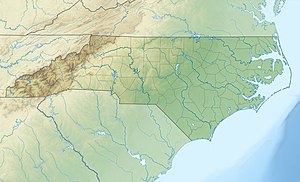Lick Branch (Dutch Buffalo Creek tributary)
Appearance
| Lick Branch Tributary to Dutch Buffalo Creek | |
|---|---|
| Location | |
| Country | United States |
| State | North Carolina |
| County | Cabarrus Rowan |
| Physical characteristics | |
| Source | Cold Water Creek divide |
| • location | about 3 miles east of Kannapolis, North Carolina[2] |
| • coordinates | 35°30′24″N 080°32′00″W / 35.50667°N 80.53333°W[1] |
| • elevation | 798 ft (243 m)[2] |
| Mouth | Dutch Buffalo Creek |
• location | about 1 mile west of Rimer, North Carolina[3] |
• coordinates | 35°28′13″N 080°30′05″W / 35.47028°N 80.50139°W[1] |
• elevation | 659 ft (201 m)[3] |
| Length | 3.38 mi (5.44 km)[4] |
| Basin size | 1.62 square miles (4.2 km2)[5] |
| Discharge | |
| • location | Dutch Buffalo Creek |
| • average | 2.07 cu ft/s (0.059 m3/s) at mouth with Dutch Buffalo Creek[5] |
| Basin features | |
| Progression | Dutch Buffalo Creek → Rocky River → Pee Dee River → Winyah Bay → Atlantic Ocean |
| River system | Pee Dee River |
| Tributaries | |
| • left | unnamed tributaries |
| • right | unnamed tributaries |
| Bridges | Gregory Road, Sapp Road, Barrier Road |
Lick Branch is a 3.38 mi (5.44 km) long 1st order tributary to Dutch Buffalo Creek in Cabarrus County, North Carolina.
Course
[edit]Lick Branch rises about 3 miles east of Kannapolis, North Carolina in Rowan County,[2] and then flows southeast into Cabarrus County to join Dutch Buffalo Creek about 1 mile west of Rimer.[3]
Watershed
[edit]Lick Branch drains 1.62 square miles (4.2 km2) of area, receives about 46.8 in/year of precipitation, has a wetness index of 411.61, and is about 51% forested.[5]
References
[edit]- ^ a b "GNIS Detail - Lick Branch". geonames.usgs.gov. US Geological Survey. Retrieved 15 November 2020.
- ^ a b c "Get Maps". USGS Topoview. US Geological Survey. Retrieved 15 November 2020.
- ^ a b c "Get Maps". USGS Topoview. US Geological Survey. Retrieved 15 November 2020.
- ^ "ArcGIS Web Application". epa.maps.arcgis.com. US EPA. Retrieved 15 November 2020.
- ^ a b c "Lick Branch Watershed Report". US EPA Geoviewer. US EPA. Retrieved 15 November 2020.


